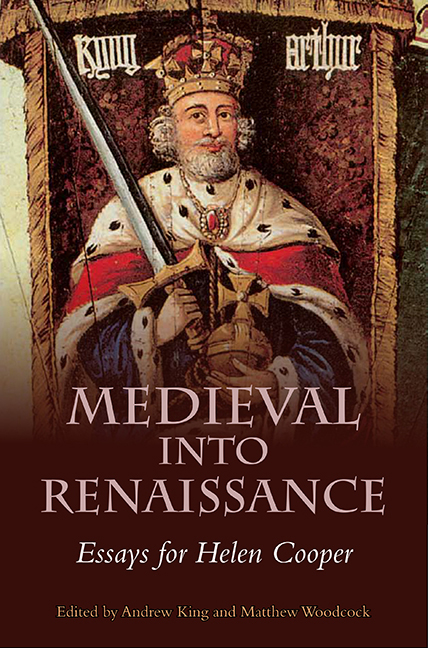Book contents
- Frontmatter
- Contents
- List of Illustrations
- List of Contributors
- Acknowledgments
- Abbreviations
- Introduction
- Unknowe, unkow, Vncovthe, uncouth: From Chaucer and Gower to Spenser and Milton
- Armour that doesn't work: An Anti-meme in Medieval and Renaissance Romance
- ‘Of his ffader spak he no thing’: Family Resemblance and Anxiety of Influence in Fifteenth-Century Prose Romance
- Writing Westwards: Medieval English Romances and their Early Modern Irish Audiences
- Penitential Romance after the Reformation
- The English Laureate in Time: John Skelton's Garland of Laurel
- Thomas Churchyard and the Medieval Complaint Tradition
- Placing Arcadia
- Fathers, Sons and Surrogates: Fatherly Advice in Hamlet
- ‘To visit the sick court’: Misogyny as Disease in Swetnam the Woman-Hater
- The Monument of Uncertainty: Sovereign and Literary Authority in Samuel Sheppard's The Faerie King
- Mopsa's Arcadia: Choice Flowers Gathered out of Sir Philip Sidney's Rare Garden into Eighteenth-Century Chapbooks
- Bibliography
- Index
- A Bibliography of Helen Cooper's Published Works
- Tabula Gratulatoria
Thomas Churchyard and the Medieval Complaint Tradition
Published online by Cambridge University Press: 05 July 2016
- Frontmatter
- Contents
- List of Illustrations
- List of Contributors
- Acknowledgments
- Abbreviations
- Introduction
- Unknowe, unkow, Vncovthe, uncouth: From Chaucer and Gower to Spenser and Milton
- Armour that doesn't work: An Anti-meme in Medieval and Renaissance Romance
- ‘Of his ffader spak he no thing’: Family Resemblance and Anxiety of Influence in Fifteenth-Century Prose Romance
- Writing Westwards: Medieval English Romances and their Early Modern Irish Audiences
- Penitential Romance after the Reformation
- The English Laureate in Time: John Skelton's Garland of Laurel
- Thomas Churchyard and the Medieval Complaint Tradition
- Placing Arcadia
- Fathers, Sons and Surrogates: Fatherly Advice in Hamlet
- ‘To visit the sick court’: Misogyny as Disease in Swetnam the Woman-Hater
- The Monument of Uncertainty: Sovereign and Literary Authority in Samuel Sheppard's The Faerie King
- Mopsa's Arcadia: Choice Flowers Gathered out of Sir Philip Sidney's Rare Garden into Eighteenth-Century Chapbooks
- Bibliography
- Index
- A Bibliography of Helen Cooper's Published Works
- Tabula Gratulatoria
Summary
Throughout his long literary career, the writer and soldier Thomas Churchyard (c.1529–1604) composed works that display an evident debt to generic traditions commonly found in fourteenth – and fifteenth-century literature (including dream vision, fabliaux, beast fable and estates satire), and that signal the influence of the style, form and concerns of writers such as Chaucer, Langland, Lydgate and Skelton. Churchyard's use of such traditions and authors is rarely viewed in a positive light, however, and he is frequently criticised or dismissed by modern critics as being backward-looking, conservative and an emblematic representative of what C.S. Lewis infamously termed the Drab Age of Renaissance verse. When briefly considering Churchyard's earliest work – the subject of the present essay – Lewis identified the presence of what he called a ‘pre-Drab’, late medieval structure and drew unfavourable comparisons between Churchyard's workmanlike metrical regularity and that of the contemporary poet and printer Robert Crowley. Although, as we shall see, these observations are fundamentally correct, the tenor of such comments and the apparently negative connotations and implications these have within Lewis's progressivist literary history need to be called into question. It should be stressed that my essay is not intended as an exercise in Lewis-bashing, which would be uncharitable in a volume dedicated to a recent incumbent of Lewis's chair in medieval and Renaissance English at Cambridge. This essay will, nevertheless, take issue with Lewis's implied resistance to appreciating nuances of continuity between medieval and Renaissance literature. I have also found myself guided here by the example of Helen Cooper's treatment of forms, genres and cultural practices that span the medieval and Renaissance periods, and the characteristically positive and receptive manner in which she handles continuities between these periods. This essay argues that Churchyard's use of medieval literary genres – focusing here on satirical complaint – is not as staid, straightforward or retrograde as has been commonly perceived. In the hands of writers such as Chaucer, Gower and Langland, the medieval complaint tradition variously attempted to expose, criticise and, ideally, reform contemporary abuses through lamenting of the state of society or the world at large, and anatomising the shortcomings of individual estates, groups, or institutions. After considering how we can identify the essential continuity of this tradition into the mid-sixteenth century, attention turns to two examples of Churchyard's use of satirical complaint, both from the 1550s.
- Type
- Chapter
- Information
- Medieval into RenaissanceEssays for Helen Cooper, pp. 123 - 142Publisher: Boydell & BrewerPrint publication year: 2016

